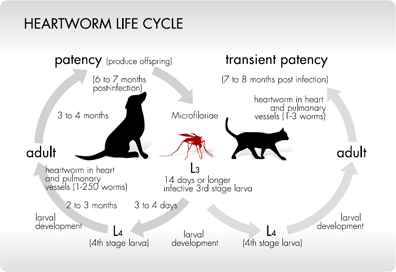Heartworm Disease in Dogs
Heartworm disease in dogs is caused by a roundworm (nematode) parasite called Dirofilaria immitus, which is carried by mosquitoes. It is more common in warm, humid areas but can be seen anywhere, especially as animals are often moved around geographically.
Life Cycle of Heartworms
Animals cannot directly infect each other with heartworm. (A mosquito is the go-between.)

© Copyright 2007 | American Heartworm Society
The life cycle of a canine heartworm is as follows:
- Female worms in an infected animal lay eggs which hatch into early larvae (microfilaria) in the bloodstream.
- A mosquito bites the animal and drinks the microfilaria with the blood.
- The microfilaria become mature larvae within the mosquito.
- When the mosquito bites the next animal, these larvae are deposited onto the victim's skin and then crawl into the hole left by the mosquito. The larvae mature further within the bloodstream, and as adults they settle into the heart and the pulmonary vessels (the arteries and veins that carry blood between the heart and lungs).
- The adult worms can then mate and lay eggs, continuing the cycle.
The entire process from an uninfected dog being bitten by an infected mosquito to being able to infect another mosquito with microfilaria takes about 7 to 9 months.
Clinical Signs of Heartworm in Dogs
Signs of heartworm disease in dogs include coughing, wheezing, exercise intolerance, and weight loss. The number of worms infecting a given dog range from 1 to 250, with the severity of clinical signs related to how many worms are clogging the heart and pulmonary vessels.
Diagnosis of Canine Heartworm Disease
There are two main ways to diagnose heartworm infection.
The first is to look for actual microfilaria in the dog's bloodstream. However, if a dog is only infected with male worms, immature worms, or a single unfertilized female, there won't be any larvae.
The more common method is to look for a heartworm substance called an antigen in the bloodstream. This is not dependent on the reproductive capabilities of the worms but does require them to be mature, which can take an average of 7 months. This blood test can be sent to a laboratory or is often done as a quick (5 minute) in-house test at the veterinary clinic.
Imaging studies, such as X-rays or echocardiography, can also find evidence of heartworm infection, but these are not routine screening tests.
Treatment of Heartworm Disease in Dogs
There are several heartworm treatment options for dogs. The most common treatment is an injection of a medication that kills the mature worms. A follow-up injection is usually given one month after the initial injection. As the worms die, they pass into the lungs, which carries some risk, especially in severely affected dogs. For this reason, strict rest and additional medications such as prednisone are usually prescribed for several weeks during and after these injections.
Prevention of Canine Heartworms
There are a number of preventatives available for dogs susceptible to heartworm disease. These include daily or monthly tablets and monthly spot-on treatments. There is also a 6-month injectable preventative available for dogs only. These preventatives are often part of a multipurpose product that also contains other dewormers, flea controls, and/or mosquito repellants, and your veterinarian can help you pick the most appropriate one for your dog. The goal of the preventatives is to stop any larvae in the bloodstream from maturing into adult worms.
Dogs older than 6 months need to be tested prior to administration of preventatives because some of these medications are dangerous to already infected dogs.
Further Reading
For more information, check out The American Heartworm Society.
Note: There is no species-specificity of heartworm. In fact, it is most likely that a mosquito biting an infected dog is the source of transmission into cats because there are so many fewer infected cats and because cats often have a sterile infection, which means the worms infecting the cat don't produce the eggs that could be transmitted via a mosquito to another animal.
You May Also Like These Articles:
Dog Fleas: How to Look for Fleas on Your Dog
Lick Granuloma: Causes, Treatments, and Prevention of Acral Lick Granuloma in Dogs
Dealing With Canine Scratching and Licking
Disclaimer: This website is not intended to replace professional consultation, diagnosis, or treatment by a licensed veterinarian. If you require any veterinary related advice, contact your veterinarian promptly. Information at DogHealth.com is exclusively of a general reference nature. Do not disregard veterinary advice or delay treatment as a result of accessing information at this site. Just Answer is an external service not affiliated with DogHealth.com.


